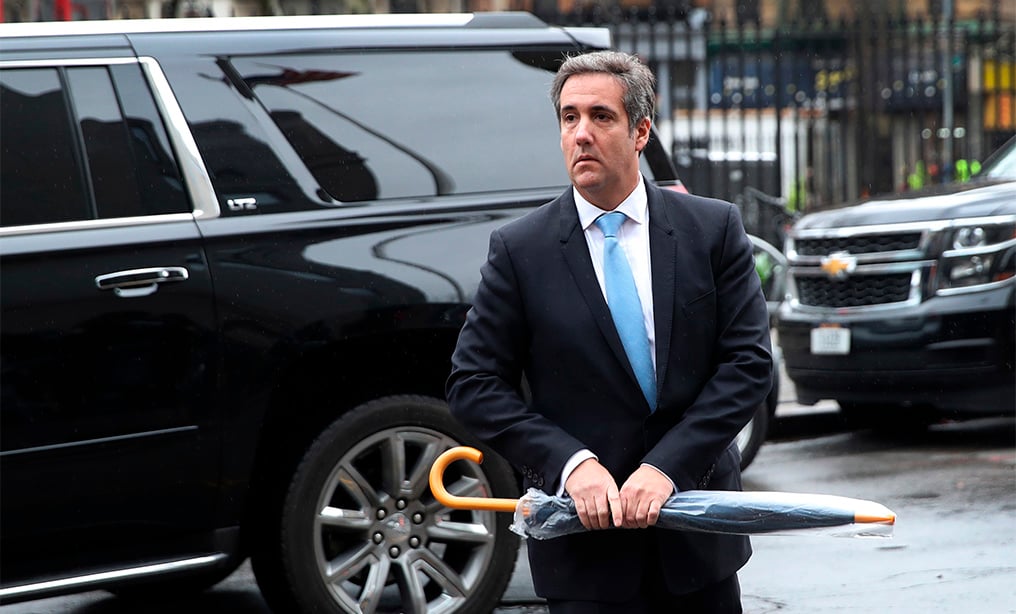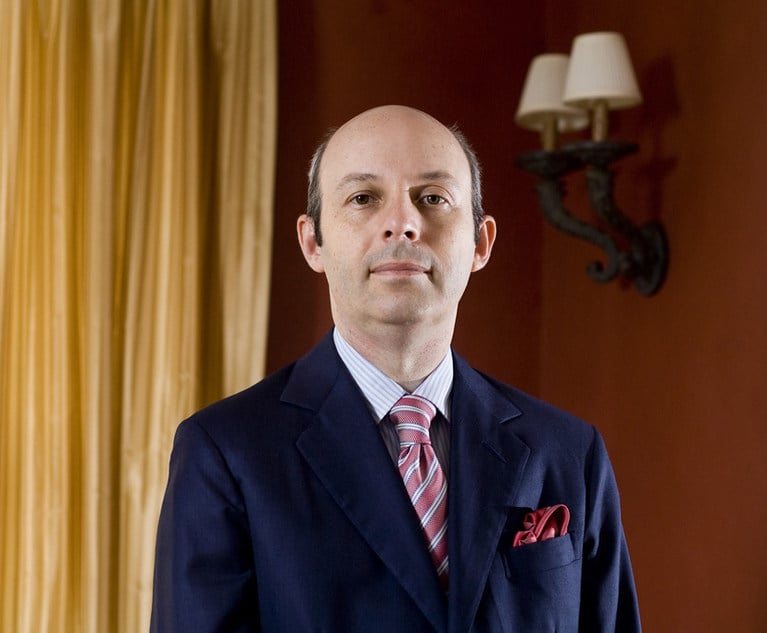Fox Host Hannity Revealed as Cohen's Third Client, as Wood Expresses Confidence in Feds' 'Filter Team'
The reveal in open court upstaged the presence of pornographic actress Stormy Daniels, who attended the hearing before U.S. District Judge Kimba Wood Monday.
April 16, 2018 at 06:54 PM
4 minute read

It may have been the appearance of adult film actress Stormy Daniels that filled the courtroom of U.S. District Judge Kimba Wood of the Southern District of New York with spectators Monday. But it was Fox News host Sean Hannity—who wasn't there—who stole the show at the second hearing in the attempt by Michael Cohen, President Donald Trump's personal attorney, to slow down federal prosecutors' criminal investigation into his activities.
Cohen was ordered April 13 to produce the names and proof of the attorney-client relationships he asserted to the court that justified a temporary restraining order request. But on Monday, talk of a TRO faded as Cohen's attorneys with McDermott Will & Emery, partners Todd Harrison and Stephen Ryan, shifted their arguments towards the appointment of a special master, at minimum, to handle the process of determining what, if any, privilege was assertable in the documents seized by federal agents a week ago from Cohen's residences and personal effects.
In their filing to satisfy Wood's order, Cohen's attorneys pointed to three specific clients of Cohen's who his team expected privilege issues would arise. One was the president. Another was former GOP fundraiser Elliott Broidy, who it was revealed earlier had to handle his own payoff of a former pornographic model. The other third person Cohen's attorneys attempted to persuade Wood shouldn't be made public, at the client's request.
Wood was unpersuaded, ordering Ryan to produce the name in open court. Cohen's third mystery client, it turned out, is Hannity. The reveal elicited a wave of gasps from the court room.
Hannity's unveiling was the high point of the nearly three-hour hearing where attorneys for Cohen and Trump continued to argue that Wood should, in the absence of an injunction, either allow the two clients to determine for themselves what potential documents were privileged or, in the alternative from Cohen's perspective, have a special master step in to mitigate the process.
Assistant U.S. Attorney Thomas McKay, arguing for the government, said that it would not only be the most efficient process to have the government, through a filter or “taint” team, segregate documents and attorney work products that then would require review of the parties and potentially the ruling from the bench. But would keep the other parties, who had a vested interest in slowing down the process by overasserting privilege on material, according to McKay.
Spears & Imes partner Joanna Hendon argued that her client, Trump, continued to argue her client's privilege interest meant he should be allowed to review material related to him to make the first cut of potentially privileged material.
Hendon said the president did not see a special master as the solution.
“He objects to anyone but himself making the initial claim of privilege,” she told the court.
Ultimately, the hearing largely resolved issues of process. Wood set aside concerns made by Trump and Cohen's counsel, stating that the Manhattan U.S. Attorney's Office's “integrity is unimpeachable,” and that a filter team could likely be trusted to handle the sensitive material. She also said she was considering appointing a special master, potentially just to handle issues related to material connected to Trump.
However, first things being first, the government is expected to essentially pull everything into one place, digitally, so Cohen and Trump—as well as the Trump Organization—will be able to have access to it. From there, prosecutors are set to work with opposing counsel to come up with search terms ahead of the database of seized material heading to Cohen's team for parsing content related to the president to be handed over to his counsel.
No specific date was set for a future conference, but all sides agreed to brief Wood in the coming days about their progress.
Daniels, who was present in the court room, was accompanied by her private attorney, Michael Avenatti.
This content has been archived. It is available through our partners, LexisNexis® and Bloomberg Law.
To view this content, please continue to their sites.
Not a Lexis Subscriber?
Subscribe Now
Not a Bloomberg Law Subscriber?
Subscribe Now
NOT FOR REPRINT
© 2025 ALM Global, LLC, All Rights Reserved. Request academic re-use from www.copyright.com. All other uses, submit a request to [email protected]. For more information visit Asset & Logo Licensing.
You Might Like
View All
Relaxing Penalties on Discovery Noncompliance Allows Criminal Cases to Get Decided on Merit
5 minute read
SCOTUSblog Co-Founder Tom Goldstein Misused Law Firm Funds, According to Federal Indictment
2 minute read
Snapshot Judgment: The Case Against Illustrated Indictments

Read the Document: DOJ Releases Ex-Special Counsel's Report Explaining Trump Prosecutions
3 minute readTrending Stories
- 1US Judge Dismisses Lawsuit Brought Under NYC Gender Violence Law, Ruling Claims Barred Under State Measure
- 24th Circuit Upholds Virginia Law Restricting Online Court Records Access
- 3Lawsuit Against Major Food Brands Could Be Sign of Emerging Litigation Over Processed Foods
- 4Fellows LaBriola LLP is Pleased to Announce that Alisha Goel Has Become Associated with The Firm
- 5Law Firms Turn to 'Golden Handcuffs' to Rein In Partner Movement
Who Got The Work
J. Brugh Lower of Gibbons has entered an appearance for industrial equipment supplier Devco Corporation in a pending trademark infringement lawsuit. The suit, accusing the defendant of selling knock-off Graco products, was filed Dec. 18 in New Jersey District Court by Rivkin Radler on behalf of Graco Inc. and Graco Minnesota. The case, assigned to U.S. District Judge Zahid N. Quraishi, is 3:24-cv-11294, Graco Inc. et al v. Devco Corporation.
Who Got The Work
Rebecca Maller-Stein and Kent A. Yalowitz of Arnold & Porter Kaye Scholer have entered their appearances for Hanaco Venture Capital and its executives, Lior Prosor and David Frankel, in a pending securities lawsuit. The action, filed on Dec. 24 in New York Southern District Court by Zell, Aron & Co. on behalf of Goldeneye Advisors, accuses the defendants of negligently and fraudulently managing the plaintiff's $1 million investment. The case, assigned to U.S. District Judge Vernon S. Broderick, is 1:24-cv-09918, Goldeneye Advisors, LLC v. Hanaco Venture Capital, Ltd. et al.
Who Got The Work
Attorneys from A&O Shearman has stepped in as defense counsel for Toronto-Dominion Bank and other defendants in a pending securities class action. The suit, filed Dec. 11 in New York Southern District Court by Bleichmar Fonti & Auld, accuses the defendants of concealing the bank's 'pervasive' deficiencies in regards to its compliance with the Bank Secrecy Act and the quality of its anti-money laundering controls. The case, assigned to U.S. District Judge Arun Subramanian, is 1:24-cv-09445, Gonzalez v. The Toronto-Dominion Bank et al.
Who Got The Work
Crown Castle International, a Pennsylvania company providing shared communications infrastructure, has turned to Luke D. Wolf of Gordon Rees Scully Mansukhani to fend off a pending breach-of-contract lawsuit. The court action, filed Nov. 25 in Michigan Eastern District Court by Hooper Hathaway PC on behalf of The Town Residences LLC, accuses Crown Castle of failing to transfer approximately $30,000 in utility payments from T-Mobile in breach of a roof-top lease and assignment agreement. The case, assigned to U.S. District Judge Susan K. Declercq, is 2:24-cv-13131, The Town Residences LLC v. T-Mobile US, Inc. et al.
Who Got The Work
Wilfred P. Coronato and Daniel M. Schwartz of McCarter & English have stepped in as defense counsel to Electrolux Home Products Inc. in a pending product liability lawsuit. The court action, filed Nov. 26 in New York Eastern District Court by Poulos Lopiccolo PC and Nagel Rice LLP on behalf of David Stern, alleges that the defendant's refrigerators’ drawers and shelving repeatedly break and fall apart within months after purchase. The case, assigned to U.S. District Judge Joan M. Azrack, is 2:24-cv-08204, Stern v. Electrolux Home Products, Inc.
Featured Firms
Law Offices of Gary Martin Hays & Associates, P.C.
(470) 294-1674
Law Offices of Mark E. Salomone
(857) 444-6468
Smith & Hassler
(713) 739-1250






